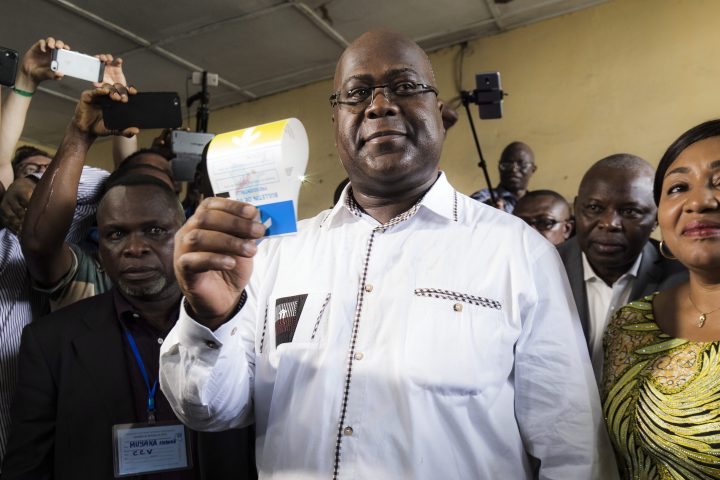Supporters of surprise Congo presidential winner Felix Tshisekedi celebrated in the capital on Thursday, while rival opposition candidate Martin Fayulu denounced the result as fraud after the long-delayed election marred by irregularities.

“Today I am happy,” Tshisekedi told supporters. “Happy for the people of Congo. Everyone is celebrating that there is peace. No one could imagine the scenario where an opposition candidate could be victorious!”
Fayulu alleged the results had been rigged, saying outgoing President Joseph Kabila made a backroom deal with Tshisekedi. Kabila appears to have negotiated with Tshisekedi to prevent anti-corruption crusader Fayulu from winning, diplomats and observers said.
Now Congo and the world face the uncomfortable choice of accepting what could be the country’s first peaceful, democratic transfer of power or raising a protest that could lead to more violence in the long-turbulent nation.
Many were waiting for a statement from the powerful Catholic church, which has said its 40,000 observers in all polling stations found a clear winner.
Several diplomats briefed on the matter told The Associated Press that the church’s figures showed that Fayulu won a landslide majority. Two diplomats also said all major observation missions, including those of the African Union and the Southern African Development Community, showed similar results. The diplomats spoke on condition of anonymity because they were not authorized to speak to the press.
Tshisekedi, who received 38 per cent of the vote according to the electoral commission’s results, had not been widely considered the leading candidate and is relatively untested. Long in the shadow of his father, the late opposition leader Etienne, Tshisekedi startled Congo last year by breaking away from the unified opposition candidate, Fayulu, to stand on his own.
WATCH BELOW: Candidates vote in Congo election

Fayulu quickly called the announced election results “rigged, fabricated and invented” and said they do “not reflect the truth of the ballots.” He called on the Congolese people to “rise as one man to protect victory.”

Get breaking National news
Fayulu, a former Exxon manager and Kinshasa lawmaker, received 34 per cent of the vote in the official results.
“How long are we going to negotiate results?” he asked.
“In 2006, Jean-Pierre Bemba’s victory was stolen. In 2011, Etienne Tshisekedi’s victory was stolen. In 2018, victory won’t be stolen from Martin Fayulu.”
Fayulu urged the Catholic Church, which has long pressed for a fair election and deployed by far the largest observer mission, to release its results.
Even before the announcement, some observers suggested that Kabila’s government made a deal with Tshisekedi as hopes faded for ruling party candidate Emmanuel Ramazani Shadary, who received just 23 per cent of the official results.
Congo’s constitutional court has 14 days to validate the results.
WATCH BELOW: Police clash with protesters over Congo election delays

France’s foreign minister, Jean-Yves Le Drian, bluntly cast doubt on the official results, saying they did not match the findings of the Catholic observers. Reports said Belgium did the same. The United Nations secretary-general merely “took note” of the results and urged stability and peace.
The delayed results, nearly two weeks after the Dec. 30 vote, came after international pressure to announce an outcome that reflected the will of the people. The United States threatened sanctions against officials who rigged the vote.
WATCH BELOW: Ebola-hit town holds mock vote

The largely peaceful election was marred by the malfunctioning of many voting machines that Congo used for the first time. Dozens of polling centers opened hours late as materials went missing. And in a last-minute decision, some 1 million of the country’s 40 million voters were barred from participating, with the electoral commission blaming a deadly Ebola virus outbreak.
Defiantly, tens of thousands of voters in one of the barred communities held their own unofficial ballot on election day, and Fayulu won easily.
Congo’s government cut internet service the day after the vote to prevent speculation on social media. As the electoral commission met this week, anti-riot police moved into place outside.
Some Congolese weary of Kabila’s 18-year rule, two turbulent years of election delays and years of conflict that killed millions of people said they simply wanted peace. Some said they would be happy as long as Fayulu or Tshisekedi won, while recalling the violence that followed past disputed elections.
Many Congolese had objected to Shadary, suspecting that Kabila would continue to rule from behind the scenes.
WATCH BELOW: Congolese frustrated by internet shutdown during election count

Kabila has ruled since 2001 in the troubled nation rich in the minerals key to smartphones around the world and has amassed vast wealth. He is barred from serving three consecutive terms, but during more than two years of election delays many Congolese feared he’d find a way to stay in office.
Now Congo faces a new leader who is little known after spending many years in Belgium and standing behind his outspoken father. The 56-year-old Tshisekedi took over as head of Congo’s most prominent opposition party in early 2018, a year after his father’s death.
Happy Tshsekedi supporters in Kinshasa, a lively opposition stronghold, said they were delighted by their candidate’s win and happy to see Kabila step down.
“This is the coronation of a lifetime,” said the deputy secretary-general of Tshisekedi’s party, Rubens Mikindo. “This is the beginning of national reconciliation.”
But the streets of Kinshasa were largely quiet.









Comments
Want to discuss? Please read our Commenting Policy first.